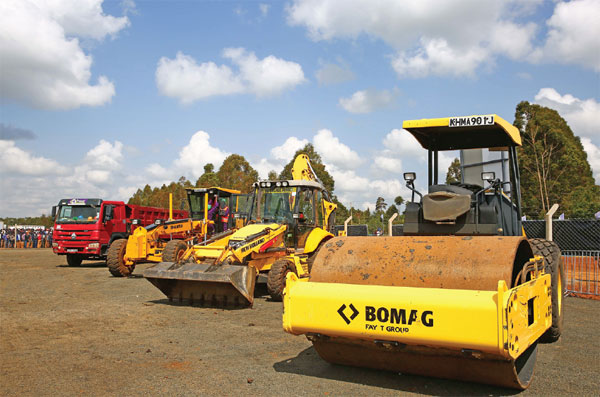Joint venture to run Kenya's first private SEZ
$20 billion project expected to significantly promote cotton and cereal farmers and drive development
In a bid to generate employment opportunities and build an inclusive economy, Kenya has launched its first privately owned special economic zone in the western part of the country.
The industrial park is a joint venture between Guangdong New South Co, located in South China's Guangdong province, and a Kenyan-based company, Africa Economic Zones. This marks the growing appetite for private-private partnerships in the East African country.
The $20 billion project in the breadbasket of the agrarian-based economy is expected to significantly promote cotton and cereal farmers and drive the economic development of the area as well as the region, which is near Uganda and Rwanda.
|
Engineering vehicles at the launching ceremony of the Special Economic Zone project, in Eldoret, Kenya on July 7. Pan Siwei / Xinhua |
"We expect to create more than 40,000 direct jobs and another 150,000 indirect jobs when fully established," says David Langat, the project's founder and chairman of Africa Economic Zones. Once operational, the production output of the project will reach $3 billion annually, he adds.
Although the groundbreaking ceremony took place on July 7, the signing of the agreement was witnessed by President Uhuru Kenyatta on May 14 while he was attending the Belt and Road Forum for International Cooperation in Beijing.
Langat says, "We have received immense support from the Kenyan and Chinese governments."
He adds that the joint venture will see the development of 530 hectares of land in three phases. Guangdong New South is expected to supervise the construction of the first phase, known as AEZ Pearl River, where 280 hectares will be used for agri-processing, textiles, electronics, chemicals and manufacturing. The infrastructure will be in place in three or four years.
The second phase will consist of a science and technology hub on 35 hectares, while the rest of the land will host a technology park, a university, an information technology hub and an incubator.
"We have fully engaged the surrounding communities, who have bought into the project buoyed by the significant benefit they would reap when they sell their produce to investors here," he says. Investors from China, Spain and Israel have shown interest in the project.
The project is under the jurisdiction of the Uasin Gishu local government, a county government headed by a governor. It is part of the North Rift Economic Bloc, which was formed by eight counties to enhance their attractiveness to foreign investors. Together, they boast 7 million people in addition to the entire East African region, for a consumer market of 200 million people.
Governor Alex Tolgos, from a neighboring county, says the Chinese investment in the area will further strengthen the strong economic ties between Kenya and China.
"The economic zone is the first one in this region and without doubt raises the economic stature of the (North Rift Economic Bloc). We welcome and support the establishment of the SEZ, knowing the positive multiplier economic effect it will have on neighboring counties," he says.
Although the project relies on its proximity to raw materials, it is about 800 kilometers from the port of Mombasa.
Langat says: "The old meter gauge railway cuts across our land. This will make it easy for us to load products destined for the port while also transporting to Uganda."
Eldoret International Airport, which is mainly a cargo distribution hub, is also available. This comes at a time when special economic zones in Africa are recording mixed results, which many experts attribute to an inadequate supply of power and water and the absence of a nearby one-stop government services office.
Rajneesh Bhuee, a research consultant in Kenya, says that for special economic zones to be successful in Africa, the investment should be heavily backed by foreign capital, production should be export-oriented and prices should primarily be driven by market forces.
"We have seen SEZs in Africa record lackluster results because of little local content in terms of business ownership and weak supply chains, as the raw materials are shipped in," she says.
lucymorangi@chinadaily.com.cn



















